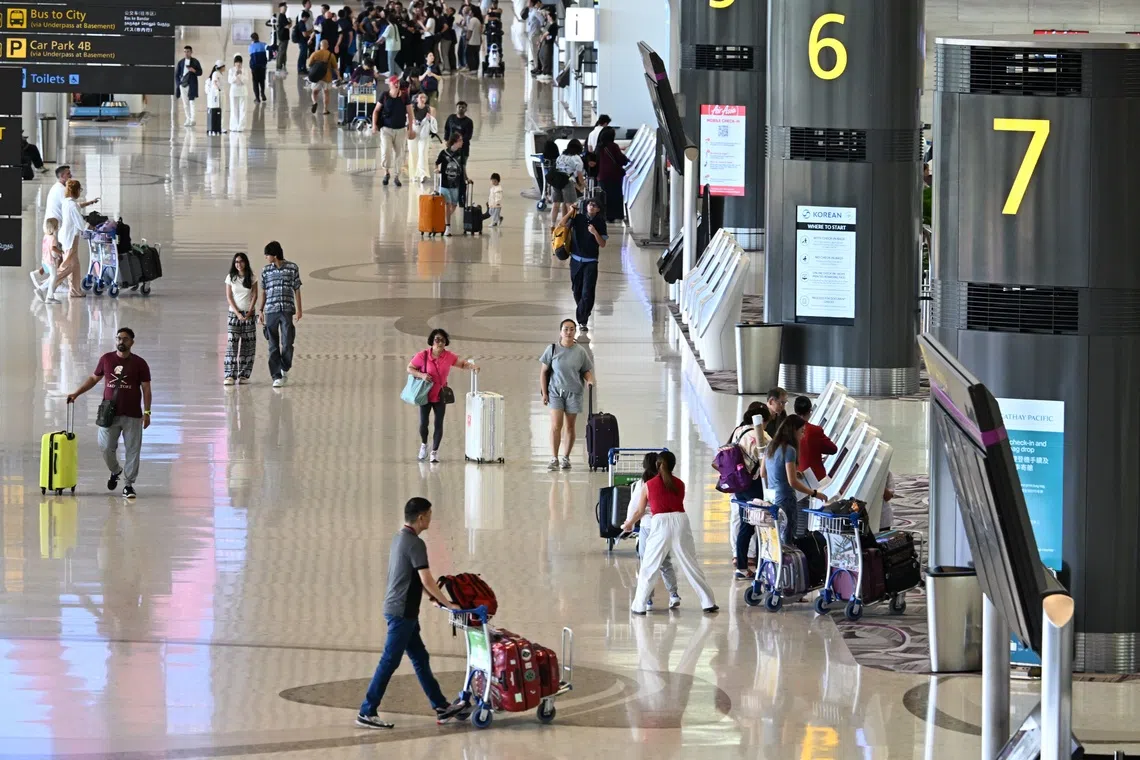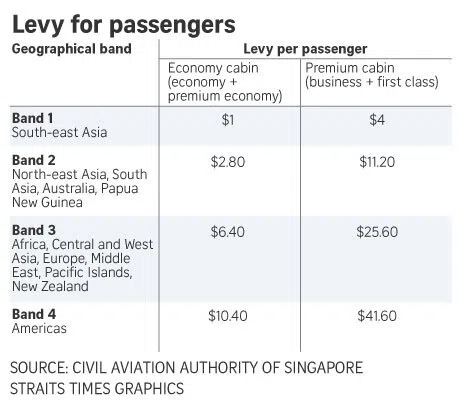Won’t ‘break the bank’: Passengers say green jet fuel levy will not deter travel
Sign up now: Get ST's newsletters delivered to your inbox

Passengers flying out of Singapore from October 2026 will pay a levy of between $1 and $41.60 that will go towards the purchase of sustainable aviation fuel.
ST PHOTO: LIM YAOHUI
Follow topic:
- Singapore will impose a sustainable aviation fuel levy on flights departing from October 2026, ranging from $1 to $41.60, depending on flight class and distance.
- Travellers acknowledge the levy's environmental benefit, but view it as another added cost to air travel. They say it's unlikely to change their travel plans.
- Singapore Airlines supports it, while logistics firms are assessing its impact.
AI generated
SINGAPORE – For real estate agent Elaine Kong, the sustainable aviation fuel levy of up to $41.60 that will be imposed on passengers flying out of Singapore from October 2026 will not break the bank.
But for travellers who are price-conscious, this may push them to choose another country to fly from, said Ms Kong, 55.
The Australian, who typically visits family here before continuing her travels to other parts of Asia and Europe from Changi Airport, has taken six business class flights out of Singapore for work and leisure so far in 2025.
Speaking to The Straits Times from Sydney, where she is based, she expressed surprise at Singapore’s decision to impose a levy at a time when people are increasingly conscious about costs and uncertain about the economic outlook.
The Civil Aviation Authority of Singapore (CAAS) on Nov 10 announced that passengers flying out of Singapore from October 2026 will pay a levy of between $1 and $41.60
It will apply to tickets sold from April 1, 2026, for flights leaving Singapore from Oct 1 that year.
Passengers in economy or premium economy class will pay between $1 and $10.40, depending on their destination.
Those who fly business or first class will pay between $4 and $41.60.

The travellers ST interviewed said that while the levy amount is not significant enough to change their travel habits, it is another fee added to the already-high cost of air travel.
Ms May Ng, 37, said she is resigned to paying the charge since there is no choice.
The personal assistant, who travels with her husband and two daughters in economy class, flies out of Singapore up to four times a year, usually to destinations within Asia.
While Ms Ng believes that adopting sustainable aviation fuel is good for the environment, “who wants to pay more?” she asked.
Still, the amount is not large enough to change her family’s travel plans or encourage her to book tickets earlier to avoid paying the levy.
Passengers who book their tickets before April 1, 2026, will not have to pay the levy, even if they are travelling after Oct 1, 2026.
Ms Claudine Ho, an administrator in the medical industry, flies up to 10 times a year.
The 53-year-old, who takes a mix of economy and business class flights, said more can be done to help travellers understand the importance of sustainability by making it relatable to the layperson, so that travellers can understand the reason behind imposing the levy.
Another frequent traveller, Mr Julius Toh, sees the levy as yet another example of the rising cost of living.
However, the 55-year-old bar owner, who travels up to eight times a year for work and with family within Asia and to Europe, said most travellers would probably not notice it.
A spokesman for national carrier Singapore Airlines told ST that the charge aligns with SIA Group’s commitment to gradually increase its use of sustainable aviation fuel.
He said it will continue to work with partners, including government agencies and fuel suppliers, to accelerate the development and commercialisation of green jet fuel.
Mr Sheldon Hee, regional vice-president for the Asia-Pacific at the International Air Transport Association, said the industry body for airlines welcomes the “lead time for the implementation and the industry consultations to clarify the implementation details”.
The timing of the levy roll-out – for tickets sold from April 2026 for flights departing from October that year – is based on industry feedback, giving airlines and passengers time to adjust, CAAS director-general Han Kok Juan said on Nov 10.
The levy will also apply to cargo shipments, calculated on a per-kilogramme basis.
It will also vary based on the distance travelled.
A spokeswoman for DHL said the global logistics company is reviewing the details of the levy, and assessing the impact on its operations and customers.
A spokesman for FedEx, another global logistics provider with operations in Singapore, said the company supports the adoption of sustainable aviation fuel to reduce carbon emissions.
He added that FedEx is reviewing the levy and evaluating its potential impact, and said it will work with parties in the industry to ensure a smooth transition.

